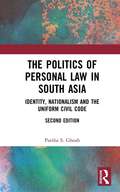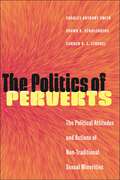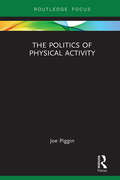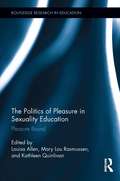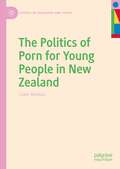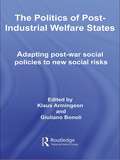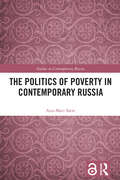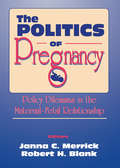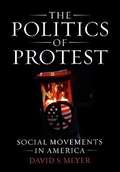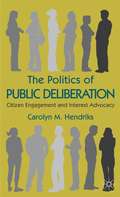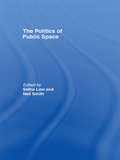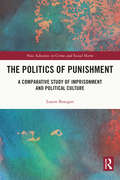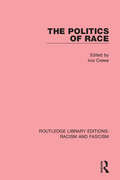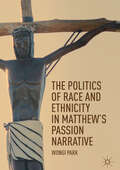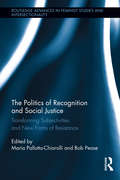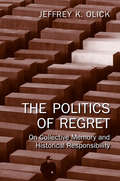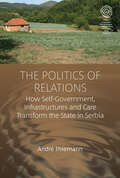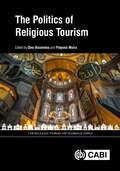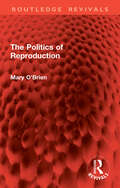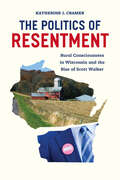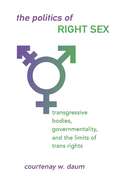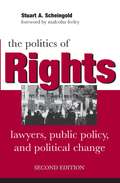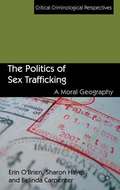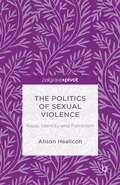- Table View
- List View
The Politics of Personal Law in South Asia: Identity, Nationalism and the Uniform Civil Code
by Partha S. GhoshThe viability of the Uniform Civil Code (UCC) has always been a bone of contention in socially and politically plural South Asia. It is entangled within the polemics of identity politics, minority rights, women’s rights, national integration, uniform citizenry and, of late, global Islamic politics and universal human rights. While champions of each category view the issue from their own perspectives, making the debate extremely complex, this book takes up the challenge of providing a holistic political analysis. As most of the South Asian states today subscribe to a decentralised view and share a common history, this study is an excellent comparative analysis of the applicability of the UCC. In this work, India figures prominently, being the most plural and vibrant democracy, as well as accounting for almost three-fourths of the region’s population. This provides the backdrop for an analysis of the other states in the region. This second edition will be indispensable for scholars, researchers and students of law, political science and South Asian Studies.
The Politics of Perverts: The Political Attitudes and Actions of Non-Traditional Sexual Minorities (LGBTQ Politics)
by Charles Anthony Smith Shawn R. Schulenberg Connor B. StrobelReveals the underexplored politics and activism of non-traditional sexual minoritiesOver the past four decades, there has been significant research focused on the political and social lives of lesbian, gay, and transgender (LGT) individuals, exploring how these sexual communities interact with politicians and voters who identify as straight. However, due to society’s binary view of sexuality, this research has overlooked non-traditional sexual minorities.To address this omission, The Politics of Perverts delves into the political attitudes and activities of individuals who identify with non-traditional sexual orientations and practices, such as Polyamory, BDSM, the Furry Fandom, Nudism, and the large bisexual population within these communities. These groups face similar discrimination, stigma, and lack of legal protections in various aspects of life.The authors shed light on the political identities, affiliations, and attitudes of these communities in theUnited States, revealing how sexuality and politics are even more deeply intertwined at the margins of society. Despite facing challenges, these communities actively engage in political discussions and activities in hopes of fostering greater inclusivity, better representation, and more informed policies.
The Politics of Physical Activity (Routledge Research in Physical Activity and Health)
by Joe PigginDefining ‘politics’ as contests over ideas, values and visions about what a physically active society could be, this book uses critical analysis to challenge accepted truths about physical activity and therefore opens up a pathway to more effective, and more socially just, physical activity policy. Critiquing global and national physical activity policies which are arguing for significant change to societies around the world, The Politics of Physical Activity presents empirical case studies to illustrate the political dimensions of advocating for physical activity promotion, including discussions of resourcing difficulties, conflicts of interest and opportunity costs. It explores physical activity as a multi-sectoral tool that is being applied to political ideas and policy goals as varied as education, sustainability and social cohesion, and asks what good physical activity really looks like. This is important and provocative reading for any student, researcher, practitioner or policy maker with an interest in physical activity, public health or public policy.
The Politics of Physician Assisted Suicide (Garland Studies on the Elderly in America)
by Nina ClarkFirst published in 1997. Routledge is an imprint of Taylor & Francis, an informa company.
The Politics of Pleasure in Sexuality Education: Pleasure Bound (Routledge Research in Education)
by Louisa Allen Mary Lou Rasmussen Kathleen QuinlivanPleasure and desire have been important components of the vision for sexuality education for over 20 years. This book argues that there has been a lack of scrutiny over the political motivations that underpin research supportive of pleasure and desire within comprehensive sexuality education. In this volume, key researchers in the field consider how discourses related to pleasure and desire have been taken up internationally. They argue that sexuality education is clearly shaped by specific cultural and political contexts, and examine how these contexts have shaped the development of pleasure’s inclusion in such programs. Via such discussions, this volume incites a re-configuration of thought regarding sexuality education’s approach to pleasure and desire.
The Politics of Porn for Young People in New Zealand (Studies in Childhood and Youth)
by Claire MeehanThis book sheds light on young New Zealander’s social realities and lived experiences of their digital and sexual lives through an understanding of how they think about and engage with porn. Drawing on qualitative empirical data from interviews with 106 young New Zealanders, each chapter examines young people’s creation of informal norms through an investigation of the broader issues associated with their engagement with porn, namely consent, gender, pleasure and ‘empowerment.’ Following this, the book gives voice to young New Zealander’s perceptions of the value of the sexuality education they receive. Finally, this text argues toward a co-constructed intersectional sexuality education.
The Politics of Post-Industrial Welfare States: Adapting Post-War Social Policies to New Social Risks (Routledge Studies in the Political Economy of the Welfare State)
by Giuliano Bonoli Klaus ArmingeonThis new study assesses the welfare state to ask key questions and draw new conclusions about its place in modern society. It shows how the welfare states that we have inherited from the early post-war years had one main objective: to protect the income of the male breadwinner. Today, however, massive social change, in particular the shift from industrial to post-industrial societies and economies, have resulted in new demands being put on welfare states. These demands originate from situations that are typical of the new family and labour market structures that have become widespread in western countries since the 1970s and 1980s, characterised by the clear prevalence of service employment and by the massive entry of women in the labour market. Against this background, this book: * presents a precise and clear definition of 'new social risks'. A concept being increasingly used in welfare state literature. * focuses on the groups that are mostly exposed to new social risks (women, the young, the low-skilled) in order to study their political behaviour. * assesses policymaking processes that can lead to successful adaptation. It covers key areas such as child care, care for elderly people, adapting pensions to atypical career patterns, active labour market policies, and policy making at the EU level. This book will be of great interest for all students and scholars of politics, sociology and the welfare state in particular.
The Politics of Poverty in Contemporary Russia (Studies in Contemporary Russia)
by Ann-Mari SätreThis book provides an overview of poverty and well-being in Russia. Increasing poverty rates during the 1990s were followed by greater attention to social policies in the 2000s and increased efforts to engage people in socially oriented NGOs and ‘encourage’ them to contribute to the fulfillment of social aims. What impact did these developments have on the prevalence of poverty in contemporary Russian society? Tracing continuities from the Soviet system alongside recent developments such as the falling price of oil, economic sanctions, and changes in directions of social policy, this book explores the impact of poverty, inequality and social programmes. The author examines the agency of people living in poverty and those engaged in social policy, using official statistics, survey data and interviews from four Russian regions to explain the reasons and consequences of poverty and people’s attempts to get out of it. The approach is based on institutional theory, complemented by Amartya Sen’s capability approach highlighting the importance of agency and an institutional framework as a means for change. A timely book that will be of interest to students of contemporary Russian politics as well as those engaged in social policy issues.
The Politics of Pregnancy: Policy Dilemmas in the Maternal-Fetal Relationship
by Janna C MerrickHere is a comprehensive overview and analysis of issues concerning the maternal-fetal relationship, from abortion to surrogate motherhood. Unlike many books which cover reproductive issues in general, this book focuses in-depth on one aspect of reproduction--the maternal-fetal relationship--to give readers a detailed study of the many issues involved. The Politics of Pregnancy discusses public policy dimensions of this relationship and posits new, critical political dilemmas. Many chapters in this unique book also provide significant clinical information as well as conceptual analysis.The Politics of Pregnancy offers great diversity in terms of the disciplinary backgrounds of the authors and their ideological perspectives. Authors come from many fields, including sociology, political science, pediatrics, ethics, and psychiatry, and provide diverse, sometimes opposing, analytical positions. Some of the topics they debate include: maternal substance use during pregnancy prenatal technology pregnancy and workplace hazards court-ordered obstetrical intervention fetal experimentationReaders interested in public and health care policy, nursing, feminism, pediatrics, or ethics, will find The Politics of Pregnancy to be a stimulating and thought-provoking book. This volume also makes an excellent discussion tool for graduate courses in these areas.
The Politics of Protest: Social Movements in America
by David S. MeyerProtest is everywhere in American politics. Over the past decade, activists have staged dramatic demonstrations on such diverse issues as the war in Iraq, globalization, standardized testing, and abortion rights. Indeed, protest and social movements have become essential features of contemporary American life. The Politics of Protest offers both a historical overview and an analytical framework for understanding social movements and political protest in American politics. The book suggests that protest movements, clearly an integral part of our nation's history from the Boston Tea Party to the Civil Rights Movement, are hardly confined to the distant past. It argues that protest movements in America reflect and influence mainstream politics. In order to understand our political system--and our social and political world--we need to pay attention to protest. The Politics of Protest opens with a short history of social movements in the United States, beginning with the development of the American Republic, outlining how the American constitutional design invites protest movements to offer continual challenges. It then discusses the social impulse to protest, considers the strategies and tactics of social movements, looks at the institutional response to protest, and finally examines the policy ramifications. Each chapter includes a brief narrative of a key movement that illustrates the topic covered in that chapter. Drawing students in and clearly demonstrating how and why the subject is of importance to them, the book addresses such topics as Dorothy Day's Catholic Workers' protest against nuclear fallout drills in the 1950s, the Greensboro civil rights sit-in in 1960, and the so-called "Battle in Seattle" anti-globalization rally. Providing a concise, yet lively analysis of social movements in America, The Politics of Protest is ideal for political science or sociology courses that consider social movements and political protest.
The Politics of Public Deliberation
by Carolyn M. HendriksThis ground breaking book provides empirical and theoretical insights into the interface between deliberative democracy and the rough and tumble of interest groups in advocacy politics. It examines how deliberative ideals work alongside the adversarial realties of interest-based politics.
The Politics of Public Space: The Politics Of Public Space And Culture
by Neil Smith Setha LowWhy is public space disappearing? Why is this disappearance important to democratic politics and how has it become an international phenomenon? Public spaces are no longer democratic spaces, but instead centres of private commerce and consumption, and even surveillance and police control. "The Politics of Public Space" extends the focus of current work on public space to include a consideration of the transnational - in the sense of moving people and transformations in the nation or state - to expand our definition of the 'public' and public space. Ultimately, public spaces are one of the last democratic forums for public dissent in a civil society. Without these significant central public spaces, individuals cannot directly participate in conflict resolution. "The Politics of Public Space" assembles a superb list of contributors to explore the important political dimensions of public space as a place where conflicts over cultural and political objectives become concrete.
The Politics of Punishment: A Comparative Study of Imprisonment and Political Culture (New Advances in Crime and Social Harm)
by Louise BranganPrisons are everywhere. Yet they are not everywhere alike. How can we explain the differences in cross-national uses of incarceration? The Politics of Punishment explores this question by undertaking a comparative sociological analysis of penal politics and imprisonment in Ireland and Scotland. Using archives and oral history, this book shows that divergences in the uses of imprisonment result from the distinctive features of a nation’s political culture: the different political ideas, cultural values and social anxieties that shape prison policymaking. Political culture thus connects large-scale social phenomena to actual carceral outcomes, illuminating the forces that support and perpetuate cross-national penal differences. The work therefore offers a new framework for the comparative study of penality. This is also an important work of sociology and history. By closely tracking how and why the politics of punishment evolved and adapted over time, we also yield rich and compelling new accounts of both Irish and Scottish penal cultures from 1970 to the 1990s. The Politics of Punishment will be essential reading for students and academics interested in the sociology of punishment, comparative penology, criminology, penal policymaking, law and social history.
The Politics of Race (Routledge Library Editions: Racism and Fascism #13)
by Ivor CreweThis volume, first published in 1975, is concerned with the politics of race relations; it is divided into theoretical, empirical and methodological studies together with an extensive bibliography. A key theme in this volume is to show how the study of race relations can advance beyond traditional micro-level analysis. In the opening paper Axford and Brier, concerned about the neglect of macro-level analysis, stress the need for conceptual frameworks which would help us to understand the place of racial conflict in the British political system. They suggest that elite political groups, otherwise in conflict, have by tacit consensus eliminated race from the national political agenda.
The Politics of Race and Ethnicity in Matthew’s Passion Narrative
by Wongi ParkIn Matthew’s passion narrative, the ethnoracial identity of Jesus comes into sharp focus. The repetition of the title “King of the Judeans” (ὁ βασιλεὺς τῶν Ἰουδαίων) foregrounds the politics of race and ethnicity. Despite the explicit use of terminology, previous scholarship has understood the title curiously in non-ethnoracial ways. This book takes the peculiar omission in the history of interpretation as its point of departure. It provides an expanded ethnoracial reading of the text, and poses a fundamental ideological question that interrogates the pattern in the larger context of modern biblical scholarship. Wongi Park issues a critique of the dominant narrative and presents an alternative reading of Matthew’s passion narrative. He identifies a critical vocabulary and framework of analysis to decode the politics of race and ethnicity implicit in the history of interpretation. Ultimately, the book lends itself to a broader research agenda: the destabilization of the dominant narrative of early Christianity’s non-ethnoracial origins.
The Politics of Recognition and Social Justice: Transforming Subjectivities and New Forms of Resistance (Routledge Advances in Feminist Studies and Intersectionality #15)
by Bob Pease Maria Pallotta-ChiarolliVia a wide range of case studies, this book examines new forms of resistance to social injustices in contemporary Western societies. Resistance requires agency, and agency is grounded in notions of the subject and subjectivity. How do people make sense of their subjectivity as they are constructed and reconstructed within relations of power? What kinds of subjectivities are needed to struggle against forms of dominance and claim recognition? The participants in the case studies are challenging forms of dominance and subordination grounded in class, race, culture, nationality, sexuality, religion, age, disability and other forms of social division. It is a premise of this book that new and/or reconstructed forms of subjectivity are required to challenge social relations of subordination and domination. Thus, the transformation of subjectivity as well as the restructuring of oppressive power relations is necessary to achieve social justice. By examining the construction of subjectivity of particular groups through an intersectional lens, the book aims to contribute to theoretical accounts of how subjects are constituted and how they can develop a critical distance from their positioning.
The Politics of Regret: On Collective Memory and Historical Responsibility
by Jeffrey K. OlickIn the past decade, Jeffrey Olick has established himself as one of the world’s pre-eminent sociologists of memory (and, related to this, both cultural sociology and social theory). His recent book on memory in postwar Germany, In the House of the Hangman (University of Chicago Press, 2005) has garnered a great deal of acclaim. This book collects his best essays on a range of memory related issues and adds a couple of new ones. It is more conceptually expansive than his other work and will serve as a great introduction to this important theorist. In the past quarter century, the issue of memory has not only become an increasingly important analytical category for historians, sociologists and cultural theorists, it has become pervasive in popular culture as well. Part of this is a function of the enhanced role of both narrative and representation – the building blocks of memory, so to speak – across the social sciences and humanities. Just as importantly, though, there has also been an increasing acceptance of the notion that the past is no longer the province of professional historians alone. Additionally, acknowledging the importance of social memory has not only provided agency to ordinary people when it comes to understanding the past, it has made conflicting interpretations of the meaning of the past more fraught, particularly in light of the terrible events of the twentieth century. Olick looks at how catastrophic, terrible pasts – Nazi Germany, apartheid South Africa – are remembered, but he is particularly concerned with the role that memory plays in social structures. Memory can foster any number of things – social solidarity, nostalgia, civil war – but it always depends on both the nature of the past and the cultures doing the remembering. Prior to his studies of individual episodes, he fully develops his theory of memory and society, working through Bergson, Halbwachs, Elias, Bakhtin, and Bourdieu.
The Politics of Relations: How Self-Government, Infrastructures, and Care Transform the State in Serbia (EASA Series #49)
by André ThiemannRethinking the contributions of the Manchester School of Social Anthropology for political ethnography, the Politics of Relations elaborates its relational approach to the state along four interlaced axes of research – embeddedness, boundary work, modalities and strategic selectivity – that enable thick comparisons across spatio-temporal scales of power. In Serbia local experiences of self-government, infrastructure and care motivate its citizens to “become the state” while cursing it heartily. While both officials and citizens strive for a state that enables a “normal life,” they navigate the increasingly illiberal politics enacted by national parties and which are tolerated by trans-national donors.
The Politics of Religious Tourism (CABI Religious Tourism and Pilgrimage Series)
by Dr Daniel H Olsen Associate Professor Anna Trono Valentina Castronuovo Xosé M. Santos Charlotte Lee Dr Elisa Piva Stefania Cerutti Dane Munro Dimitrios Mylonopoulos Panagiota Manoli Silvia Aulet Serrallonga Masahiro Omae Maria Angelica Orozco Jorge Olleros-Rodriguez Spyridon Parthenis Francisco SingulAddressing a dearth of literature in this area, this book provides a comprehensive overview and framework of study of the politics of religious tourism. Existing work shows awareness that politics is present but the approach has been one of benign neglect, and/or a priori assumptions about the role of politics in the management of sacred sites. Previous literature is fragmented into various perspectives and approaches that best serve different disciplinary interests. By understanding the politics of religious tourism through the various perspectives and approaches from the discipline of political science, law, public policy, and other fields, this book: · Focuses on how power is exercised regarding religious tourism. · Looks at the governing institutions of religious tourism including the role of relevant governmental bodies such as ministries of tourism or national tourism boards, ministries of religion and/or culture. · Covers the role and influence of religious governing institutions, such as state-supported church/mosque officials, and universities. This book will be of great interest to researchers and students of religious tourism, pilgrimage, as well as related subjects such as political science, economics, sociology, tourism, law studies, and religious studies.
The Politics of Reproduction (Routledge Revivals)
by Mary O'BrienFirst published in 1981, The Politics of Reproduction is a critique of traditional political thought. It focuses centrally upon the nature and difference of male and female experience of biological reproduction, and upon the impact of male reproductive experience on the theory and practice of politics.Mary O’Brien presents a controversial revision of dialectical materialism, arguing the Marx, as a charter-member of an exclusively masculine tradition of political thought, could not provide the theoretical grounds for true social reformation. Only feminism, she argues, is currently a major progressive force in western history: the impact of reproductive technology on female consciousness is a world historical event which must be given theoretical and political expression.The new model of historical process offered here, in preliminary form, gives due weight to the struggle of the sexes which has its historical reality in the separation of public and private life. The model is founded on an analysis of male-stream thought from the Athenian polis to our own day, and it makes possible a radical interpretation of contemporary women’s experience that never lapses into either a historicism or simple rage.
The Politics of Resentment: Rural Consciousness in Wisconsin and the Rise of Scott Walker (Chicago Studies in American Politics)
by Katherine J. CramerSince the election of Scott Walker, Wisconsin has been seen as ground zero for debates about the appropriate role of government in the wake of the Great Recession. In a time of rising inequality, Walker not only survived a bitterly contested recall that brought thousands of protesters to Capitol Square, he was subsequently reelected. How could this happen? How is it that the very people who stand to benefit from strong government services not only vote against the candidates who support those services but are vehemently against the very idea of big government? With The Politics of Resentment, Katherine J. Cramer uncovers an oft-overlooked piece of the puzzle: rural political consciousness and the resentment of the "liberal elite." Rural voters are distrustful that politicians will respect the distinct values of their communities and allocate a fair share of resources. What can look like disagreements about basic political principles are therefore actually rooted in something even more fundamental: who we are as people and how closely a candidate's social identity matches our own. Using Scott Walker and Wisconsin's prominent and protracted debate about the appropriate role of government, Cramer illuminates the contours of rural consciousness, showing how place-based identities profoundly influence how people understand politics, regardless of whether urban politicians and their supporters really do shortchange or look down on those living in the country. The Politics of Resentment shows that rural resentment--no less than partisanship, race, or class--plays a major role in dividing America against itself.
The Politics of Right Sex: Transgressive Bodies, Governmentality, and the Limits of Trans Rights
by Courtenay DaumExamines the limitations of rights-based mobilization and litigation for advancing the interests of trans individuals in the contemporary United States. <p><p> While the growing attention to trans rights and the development of trans-specific interest groups suggest that the time is right for a trans rights movement akin to prior civil rights movements, The Politics of Right Sex explores the limitations of rights-based mobilization and litigation for advancing the interests of trans communities. Synthesizing critical theory, transgender studies, and extant law and society research, Courtenay W. Daum argues that trans individuals, particularly those situated at the intersection of gender, race, class, and immigration status, are regulated by myriad forces of governmentality that work to maintain the sex and gender binaries and associated power hierarchies. Because many informal practices and norms are located beyond the reach of civil rights laws, a trans politics of rights may produce some modest legal and legislative reforms but will not eliminate the disciplinary forces that work to subject trans individuals. It will also privilege those who are able to conform with dominant gender norms at the expense of the interests of those individuals who are gender nonconforming, gender queer, trans people of color, and others unable or unwilling to embrace a transnormative presentation of self and/or lifestyle. In order to disrupt the dominant discourse and hierarchical power arrangements in pursuit of collective liberation for all as opposed to rights for some, The Politics of Right Sex advocates for a more confrontational approach that directly engages and challenges the hegemonic power structures that govern and discipline trans individuals.
The Politics of Rights
by Stuart A. ScheingoldStuart A. Scheingold's landmark work introduced a new understanding of the contribution of rights to progressive social movements, and thirty years later it still stands as a pioneering and provocative work, bridging political science and sociolegal studies. In the preface to this new edition, the author provides a cogent analysis of the burgeoning scholarship that has been built on the foundations laid in his original volume. A new foreword from Malcolm Feeley of Berkeley's Boalt Hall School of Law traces the intellectual roots of The Politics of Rights to the classic texts of social theory and sociolegal studies.
The Politics of Sex Trafficking: A Moral Geography (Critical Criminological Perspectives)
by Sharon Hayes Erin O�brien Belinda CarpenterThis book offers a unique insight into the moral politics behind human trafficking policy in Australia and the USA, including rare interviews with key political actors, and a critical account of Congressional and Parliamentary hearings.
The Politics of Sexual Violence: Rape, Identity and Feminism
by A. HealiconWith the recent media interest in celebrity childhood sexual abuse and rape cases, we think we know what sexual violence is and who 'rape victims' are. But this portrayal is limited. Drawing on in-depth accounts from women who have experienced rape, this book revisits issues of credibility, responsibility and feminism to provide missing details.
